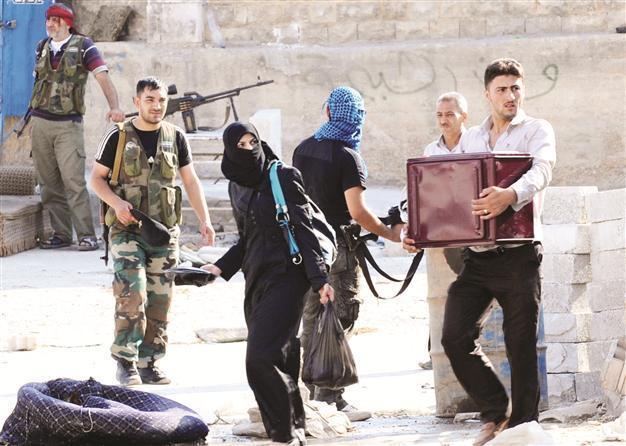Unhappy with Barzani’s move, FM heads to Arbil
ANKARA - Hürriyet Daily News

Syrian civilians carry their belongings as they flee clashes between the Syrian opposition and forces loyal to President Bashar al-Assad, in northern city of Aleppo. AFP photo
The Kurdistan Regional Government’s (KRG) recent joint mobilization with Syrian Kurds could potentially cause further ethnic polarization along Turkey’s southern border, Turkish officials have said ahead of Foreign Minister Ahmet Davutoğlu’s key visit to Arbil next week.Prime Minister Recep Tayyip Erdoğan has announced that Davutoğlu would pay a visit to northern Iraq by Aug. 1 at the very latest to “share Turkey’s sensitivities and determination on this issue” with local administration officials.
At a press conference yesterday before he left for Britain, Erdoğan further warned Iraqi Kurds, saying Ankara wanted Arbil to know that Turkey would no longer be responsible for anything
that happens.
The reason Davutoğlu would visit Arbil was to say, “Don’t let [anyone] take wrong steps. Don’t harm our feeling of confidence in you. On the contrary, we should take steps together in order to correct those mistakes,” the prime minister said.
Noting that there was already a Kurdish-origin Syrian heading the Syrian National Council, Erdoğan said, “It’s a wrong approach to set up a Syrian Kurdish National Council.”
Barzani remarks
Turkey was made uneasy by remarks from Iraqi Kurdish leader Masoud Barzani indicating that the KRG was training Kurdish-Syrian fighters who will then be sent back to defend Kurdish territory at home through an “Arbil agreement” between Iraqi Kurds and PYD, known to be an affiliate of the outlawed Kurdistan Workers’ Party (PKK).
No revolution of a group
“No one should try to turn the Syrian revolution into a revolution for a specific group,” a Turkish official told the Hürriyet Daily News after a July 25 security meeting, referring to the recent cooperation between Syrian and Iraqi Kurds.
It was decided that Davutoğlu would visit the northern Iraqi capital Arbil following the July 25 security summit, which especially focused on the PKK’s activities in Syria.
While Syria’s Kurds have stepped up to form an autonomous region in northern Syria similar to that in northern Iraq, Ankara does not intend to cease its support for the democratic transition in Syria. This process should be a “managed and controlled orderly transition” that does not drive forward the specific demands of particular ethnic or sectarian groups, the official said.
Following a stable transition process in the conflict-hit country, “The Syrian people should decide the future of the entire country,” the source said.
Ankara objects to the possibility of any safe haven for the PKK in northern Syria similar to that which the organization enjoys in the Kandil Mountains of northern Iraq.
In northern Iraq, Kurds have carved out a semiautonomous region, and fears are on the rise in Turkey that the same could happen on the country’s doorstep in northern Syria.
















